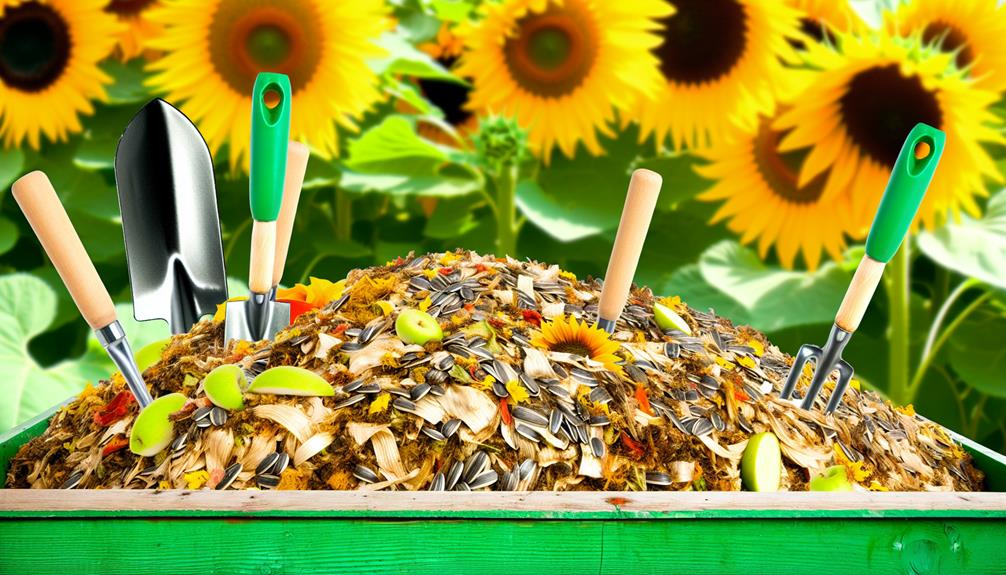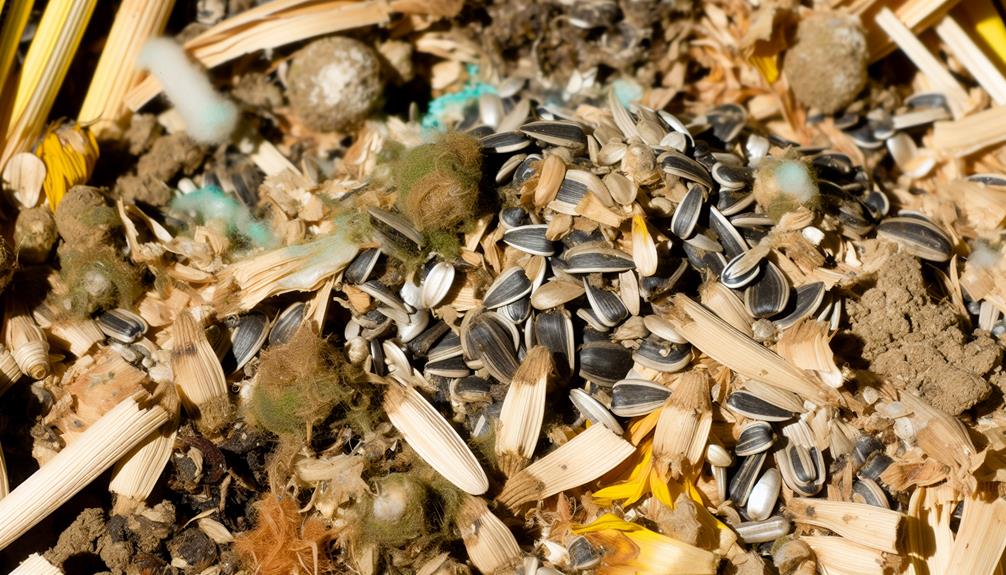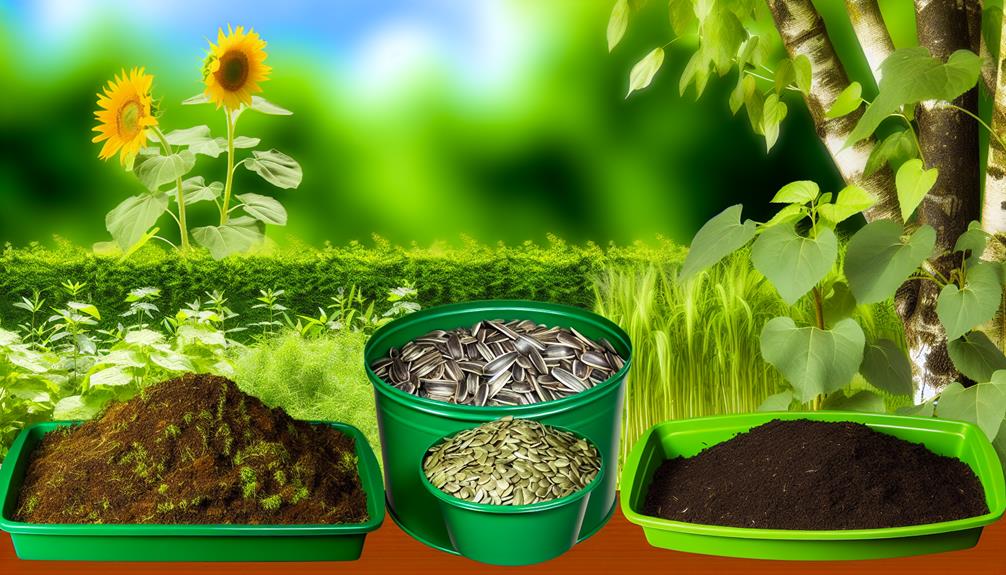

You can compost sunflower seeds, but there are a few factors to take into account. Their high oil content may slow down decomposition, so it’s helpful to crush and mix them with other compost materials. Balance the compost by adding green and brown materials, ensuring moisture and air circulation.
Watch for potential issues like mold and rodent attraction. Removing viable seeds helps prevent unwanted plant growth. Regular turning and monitoring of your compost pile aid faster decomposition. For best results, spread the finished compost evenly over your garden beds, lightly mixing it into the soil. Learn more to optimize your composting process.
Composting sunflower seeds can lead to substantial cost savings, offering numerous benefits, including enriching your soil with essential nutrients. When you compost these seeds, you’re contributing to a healthier environment by reducing waste.
Instead of tossing sunflower seed shells and leftovers into the trash, you can transform them into valuable compost. This act notably lowers the environmental impact by diverting organic waste from landfills, which in turn, reduces greenhouse gas emissions.
Moreover, composting sunflower seeds can result in a significant reduction in costs. By creating your compost, you won’t need to buy commercial fertilizers, which can be expensive and often contain chemicals. Your homemade compost provides a natural alternative, supplying your garden with the same, if not better, nutrient benefits. This sustainable practice ensures that you’re not only saving money but also promoting a healthier ecosystem.
To get started, simply collect your sunflower seed shells and mix them with other compostable materials like vegetable scraps, coffee grounds, and yard waste. Over time, these materials will break down, creating rich, nutrient-dense compost.
Also Read: Can You Compost Butter?
Sunflower seeds are packed with essential nutrients that can greatly enrich your compost. When you add sunflower seeds to your compost pile, you’re not just disposing of waste; you’re contributing to soil enrichment in a significant way. These seeds contain a high protein content, which is excellent for promoting the growth of beneficial microorganisms in your compost.
Sunflower seeds also have substantial amounts of potassium and phosphorous. These nutrients are crucial for plant health and can improve the overall quality of your compost. By incorporating sunflower seeds into your compost, you’ll create a nutrient-rich medium that supports robust plant growth. This makes your garden healthier and more productive.
You might be surprised to learn that sunflower seeds also contain essential fatty acids. While these are more commonly associated with human nutrition, they play a role in creating a balanced compost mixture. The decomposition of these seeds will help maintain the right moisture level and texture in your compost.
While adding sunflower seeds to your compost has many benefits, there are potential issues you should be aware of.

These challenges can affect the overall health and efficiency of your compost pile.
To mitigate these potential issues, prepare sunflower seeds properly before adding them to your compost pile. Start with seed cleaning to remove any residues or chemicals that might hinder the composting process. Rinse the sunflower seeds thoroughly under running water. This step guarantees you’re not introducing unwanted substances into your compost.
Next, consider the sprouting process. Soak the cleaned sunflower seeds in water for about 24 hours. This helps to soften their hard shells and initiate the breakdown process, making them decompose faster once added to the compost.
After soaking, spread the seeds out on a tray and allow them to dry for a day or two. This brief drying period prevents clumping and ensures even distribution when you mix them into your compost.
Also Read: Can You Compost Broccoli?
Integrate sunflower seeds into your compost by combining them with diverse organic materials to enhance the overall decomposition process. Mixing sunflower seeds with various organic additives helps create a balanced compost that breaks down efficiently. To get the best results, you’ll want to guarantee a good mix of green and brown materials.
Consider including the following items in your compost:
When you mix sunflower seeds with these organic additives, you create an environment conducive to microbial activity, which is essential for breaking down the compost materials. This compost mixing strategy guarantees that your sunflower seeds decompose efficiently and contribute to the nutrient content of your compost.
Now that you’ve integrated sunflower seeds into your compost, let’s focus on how to effectively compost sunflower seed shells. These shells, while durable, can be a bit challenging to break down. Their shell durability means they need a little extra attention to make sure they decompose effectively.
Start by crushing the sunflower seed shells before adding them to your compost pile. This increases their surface area, allowing microbes to break them down more easily. You can do this by using a hammer or a mortar and pestle.
Next, mix the crushed shells with other compost materials, such as kitchen scraps and garden waste. This helps balance the carbon and nitrogen ratio, which is important for effective composting.
It’s also a good idea to monitor the moisture levels in your compost pile. Sunflower seed shells can dry out quickly, so make sure your compost remains damp but not waterlogged. Turn the pile regularly to aerate it, promoting faster decomposition.
Also Read: Can You Compost Basil?
Crushed sunflower seed shells typically take several months to decompose fully in a well-maintained compost pile. The decomposition rate can vary depending on several factors.

To guarantee efficient breakdown, you’ll need to take into account the following:
Temperature impact is significant in the decomposition rate of sunflower seed shells. In cooler conditions, decomposition slows down, potentially taking up to a year. In contrast, warm, actively managed compost piles can see faster breakdown within a few months.
You can enrich your garden soil by using compost that contains decomposed sunflower seed shells. This nutrient-rich compost can greatly benefit your plants, improving soil structure and fertility.
When you include sunflower seed shells in your compost, they break down over time and contribute valuable organic matter.
One thing to note is that sunflower seeds are commonly used in bird feeding. If your compost pile contains seeds from bird feeders, you might notice some seed germination. While this isn’t typically a problem, you can turn your compost regularly to minimize unwanted sprouts.
To effectively use compost containing sunflower seed shells, spread it evenly over your garden beds and lightly mix it into the soil. This practice ensures that the nutrients are accessible to your plants.
If you’re worried about seed germination, you can also sift the compost before applying it to remove any larger seed pieces that haven’t fully decomposed.
Yes, sunflower husks can attract pests to your compost pile. To guarantee pest mitigation, mix the husks well with other compost materials and keep the pile properly aerated. You’ll create a healthier, pest-free compost environment.
You’re wondering if specific sunflower seed varieties are better for composting, right? Opt for hull-less sunflower seeds. Their faster decomposition will enrich your compost pile without the tough hulls slowing down the process.
Weather conditions impact composting greatly. You need to monitor moisture levels and temperature fluctuations. Too much moisture can cause rot, while extreme temperature swings can slow down decomposition. Stay connected and share your composting tips with the community!
You shouldn’t compost salted sunflower seeds because the salt content can harm the microbial activity essential for breaking down organic matter. Your compost relies on these microbes, so it’s best to avoid adding anything salty.
When adding sunflower seeds to your compost, you’re not likely to affect the soil acidity significantly. They naturally decompose and help maintain the pH balance, so you can confidently include them in your composting community.
To successfully compost sunflower seeds, remember to first crush or grind them to speed up decomposition.
Mix them with diverse organic materials for balanced nutrient content.
Be mindful of potential allelopathic effects and avoid large quantities.
Confirm shells are broken down as well.
With patience and proper preparation, you’ll create nutrient-rich compost that benefits your garden.
Stick to these guidelines, and you’ll make the most of sunflower seeds in your composting efforts.
